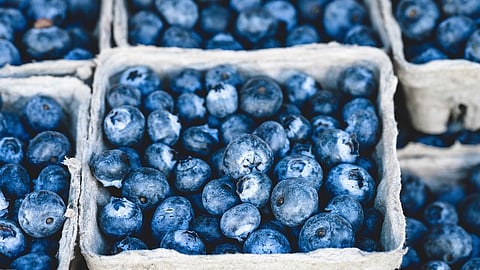SA’s blueberry industry panics, 40k jobs on the line as ANC’s ‘developmental state’ monopoly implodes
The ideology behind the ANC's 'developmental state' fantasy is in tatters as another of the State monopolies – this time the South African ports – has been exposed by the current Transnet strike. Justin Mudge, chairman of the umbrella body for SA's berry producers, says his industry's 40 000 jobs are on a knife edge as the Transnet strike comes at the height of the blueberry picking season. With SA's ports closed because the state has zero contingency plan for perishable exports, the producers' only economically viable route to their global customers has been shut. He spoke to Alec Hogg of BizNews.
Excerpts from the interview with Justin Mudge
Justin Mudge on the scale of berry production in South Africa
If we talk in round numbers, the berry industry is approximately 3,000 hectares. For every hectare that needs to be harvested, we are talking about 10 harvest opportunities per hectare and then somewhere in the region of north, three permanent employees per hectare. So, probably around 40,000 employees have their livelihoods at stake owing to the Transnet strike.
On how long South Africa has been in the global berries market
There have been small volumes of blueberries since the mid-nineties in South Africa, but really very small. However, since 2005, when access to newer genetics put us in a timing slot from – let's call it September to December – it became a much more attractive industry. And probably since about 2015, you will see the graph has just taken off. We have added a lot of hectares in the last five years and it has become a significant industry in South Africa.
On the investment per hectare
It ranges depending on your investment strategy. The top-end investment with the structure and medium can be north of R3m a hectare, but the average is probably sitting somewhere around R1.8m, R1.9m per hectare.
On the intensive cultivation of berries
It's extremely intensive and it is a very high-value product. This is the reason we are particularly hot in the pipes. I'm getting very excited about this protracted strike because it is also a highly perishable product that cannot be left on the bush to be harvested when the ports open. We have to continue harvesting and shipping, otherwise, we destroy the inherent quality of the product. Every day that we cannot ship is a day's worth of shelf life that our customer loses. We are already struggling to ensure our quality perception, which is inherent to South African fruit production, is maintained because of the unseasonal and untimely delays the berry industry has experienced for the last consecutive four years.
On whether berries are viable to fly
Of course, we can put it in an aeroplane. However, with the worldwide production of berries where it is, it is no longer viable to fly. As a result of the way supply and demand have balanced out the market pricing, it is now based on a sea freight price. If you airfreight it, you can get some concessions from your customers in times of their needs; then they might be prepared to pay the premium to fly it. But with the quality of berries that we have now and with the ability to sea freight, that is the benchmark price. Yes, we can fly it, but we certainly cannot fly the kind of volumes we are producing right now. There are just not enough flights. I mean, I have just seen a news article that we are probably going to run out of aeroplane fuel, too. So, that's not an option either. It really is a dire situation for us.
On berry producers at risk of not breaking even in the coming season
Our peak weeks are from week 40 to week 48 as an industry. There is a reasonable tail after week 49 and there is volume that comes in before week 40 but those are the shoulders. We are right in the middle of it right now. Most generics will allow you to pick maybe once a week and, in some cases, twice a week. And then the target is to get that fruit onto its journey within 72 hours. Those are the kind of timelines we try to hold ourselves to as an industry because every single day we can save in the journey gives our customers the ability to flex demand as retail kicks in. So, it's a very critical flow that needs to be maintained with weekly shippings, as you can arrange with your receivers to manage the volumes, etc. But if you have a hiatus of 10 or more days, you are essentially landing twice the product in the market. If this thing is protracted, we are going to land three times the volume in the market, three to four weeks from now. The market is just not that flexible. The only mechanism we have is to discount and to go onto massive, deep-cutting promotions to move the volume. Right now, that's just not feasible for the majority of blueberry producers. Food Dater, an economic benchmarking survey, has said that a third of all producers are at risk of not breaking even in the coming season. And that's not because they're bad farmers, it is because we are in a nascent industry where we're still learning a lot. We still have to identify which genetics work in which regions. There is a lot of experimentation taking place. With the change in supply and demand dynamics, a lot of producers are going to be at risk because the price is not there to cover the areas as it perhaps was in the past.
See also:

